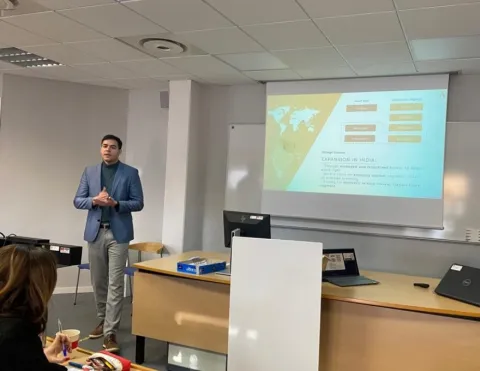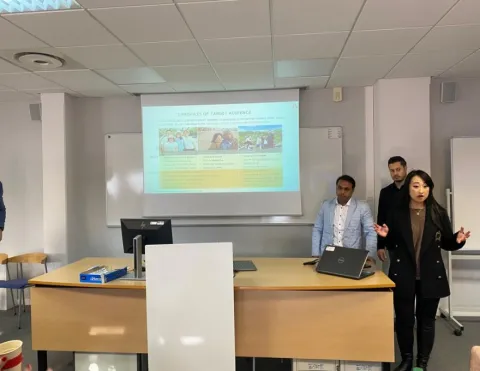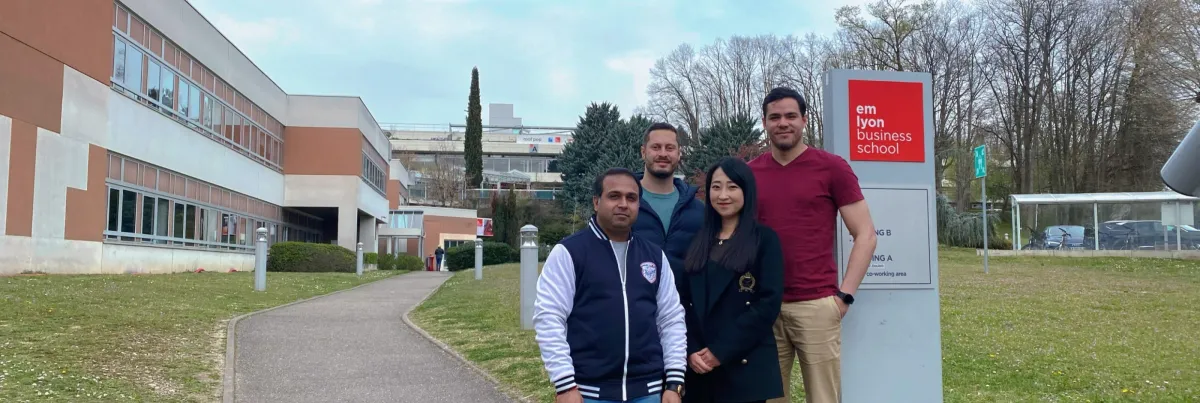IMBA students explore a business gateway to India
Over January and February 2023, a diverse four-strong team of emlyon business school IMBA students were tasked with performing a strategic analysis and expansion proposal for the renowned Accor hotel group. Pooling together a broad range of skills from various working backgrounds, the students embarked on a project that would teach them as much about themselves as the business case in hand.

Vipin Chugh (India), Philippe Saadallah (Lebanon), Davi Torres (Brazil) and Sarah Xu (China) began the project with a wealth of experience covering many of the bases that their project would entail, namely Economics, Project Management, Strategy, Project Engineering, Marketing, M&A, and Leadership. For team member Sarah, diversity was crucial when the case study was in its infancy and roles had to be defined: “we brought to the table a lot of different skills. Given that we were going to have to adopt a back to the drawing board approach, being able to cover so many areas when starting our analysis of Accor from many perspectives was a real asset”.
A field in transition
The initial project brief involved analysing the current strategy of the Accor group in terms of HR, finance, marketing, and strategy, to name a few angles. With expert professors to call upon for guidance when needed, the team examined Accor’s current strategy in the face of changing industry dynamics and competitors, with particular focus given to the group’s performance in light of this ever-evolving business landscape. For Vipin, whilst the project was wide-ranging, the goal was clear and precise: “we pooled our various cultures and experiences together to ensure that we delivered something of value to Accor.
To achieve this, no-one worked in isolation. We were a diversified team with one common goal”.
The case of India
From an overall analysis came a conscious decision to home in on a particular region in order to make the team’s eventual proposal as concrete and relevant as possible. Philippe explains the thinking behind choosing India as the focal point: “we had already identified the IMEAT (India, Middle East, Africa, and Turkey) zone, having already looked at the bigger picture including performance in the US and Europe. The goal was to make recommendations either of expansion in areas where Accor is already very present or suggest implantation in new regions. We opted for the latter”. As the team heard from the Senior Vice-President during the presentation phase of the project in February, Accor has India very much in mind for its investment and expansion strategy. To begin with, however, the team had to hone their understanding of the group’s overall strategy, examine various KPIs, and then propose a strategic update.

Challenging team dynamics
When transitioning from the bigger picture early in their analysis to specific study of a chosen region, the team gave considerable thought to the consumer perspective and in so doing challenged one another’s views on a suggested future strategy for Accor. For Davi, this proved a very healthy example of stepping outside of one’s comfort zone: “*I come from a generalist professional and educational background. It was therefore a challenge for me to move from a general overview on the company to getting specific. Our proposal needed this specificity so that we could make concrete, industry-relevant recommendations.
To achieve this, we had to question ourselves and one another within the group to reach a general consensus on the way forward for Accor in India*”. The success of the team’s proposal is born out by their succeeding in reaching a shortlist of 3 projects to be presented in front of Accor.
A learning experience
As well as honing the students’ knowledge of the industry, Accor’s current strategy and performance, and potentials windows of opportunity for improvement, the project was also one of self-discovery. For Vipin the challenge lay in how to rationalise their investigations: “we started out with a relatively unstructured case and, slowly but surely, had to piece our analysis together to suggest a concrete solution”. For Sarah, respect within the team was vital to their success: “to mount a collective proposal, mutual respect and support among team members needs to be fostered. Our blend of different cultures and backgrounds was a resource to be tapped into and certainly boosted our chances of success”. For Philippe, the main learning curve was in the process: “knowing where to start and how and what to prioritise was key to successful project management and teamwork. Getting a clear and agreed roadmap in place early on made for smoother work all the way through to the final presentation”. And finally, Davi, who especially appreciated the very real nature of the initiative: “not for the first time as part of my IMBA studies, theory and practice dovetailed perfectly. By applying knowledge and experience, we came up with an idea that could provide Accor with a gateway into doing more business in India”.
